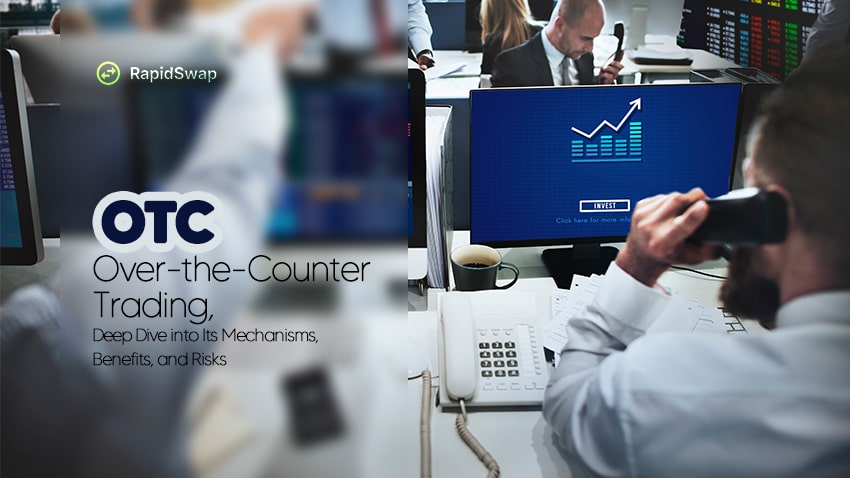Over-the-Counter (OTC) trading has emerged as a significant avenue for trading financial assets, including cryptocurrencies, particularly for those seeking privacy and the ability to conduct large transactions with minimal impact on the market. Unlike traditional trading on centralized exchanges, OTC trading occurs directly between two parties, often outside the purview of regulatory oversight. This article explores the intricacies of OTC trading, highlighting its advantages, potential pitfalls, and the reasons it has become a preferred method for many investors.
Understanding Over-the-Counter (OTC) Trading
Over-the-Counter trading is a decentralized method of buying and selling financial assets. Unlike transactions on a centralized exchange where trades are executed through an intermediary, OTC trading happens directly between the buyer and the seller. This type of trading is often facilitated by brokers or through specialized OTC desks that connect buyers with sellers. The assets traded can range from stocks and bonds to commodities and cryptocurrencies.
One of the distinguishing features of OTC trading is that it does not require the involvement of a centralized exchange. Instead, trades are negotiated privately, allowing for a high degree of flexibility in terms of transaction size and terms. This is particularly attractive for institutional investors and high-net-worth individuals who may need to execute large trades without causing significant price fluctuations in the market.
The Mechanics of OTC Trading
OTC trading typically involves the following steps:
- Negotiation: The buyer and seller agree on the terms of the trade, including the price, quantity, and settlement details. This can be done directly between the parties or through an intermediary, such as an OTC broker or desk.
- Execution: Once the terms are agreed upon, the trade is executed. Since there is no centralized exchange, the trade is often settled directly between the two parties. In the case of cryptocurrencies, this might involve transferring digital assets from one wallet to another.
- Settlement: The settlement process in OTC trading can vary depending on the asset being traded and the agreement between the parties. It may involve immediate payment and delivery or be subject to a longer settlement period.
Benefits of OTC Trading
OTC trading offers several advantages, particularly for large-scale investors:
- Privacy: Since OTC trades are conducted privately, they offer a higher degree of confidentiality. This is especially important for institutions and individuals who prefer to keep their trading activities discreet.
- Reduced Market Impact: Large transactions on a centralized exchange can lead to significant price fluctuations due to market visibility. OTC trading mitigates this risk by allowing large trades to be executed without the public’s knowledge, thereby reducing the chance of price slippage.
- Flexibility: OTC trading provides greater flexibility in terms of trade size and the types of assets that can be traded. This is particularly useful for dealing with less liquid assets or for executing customized trades that may not be possible on a traditional exchange.
- Access to Unlisted Assets: Some assets, particularly certain types of bonds or stocks, may not be listed on traditional exchanges. OTC trading provides a platform for trading these unlisted assets.
Risks Associated with OTC Trading
Despite its benefits, OTC trading comes with its own set of challenges and risks:
- Lack of Regulation: OTC markets are generally less regulated than centralized exchanges. This can lead to a higher risk of fraud, as there is less oversight to ensure that trades are conducted fairly.
- Liquidity Concerns: The decentralized nature of OTC trading can sometimes result in lower liquidity, making it difficult to execute large trades quickly without significantly affecting the price.
- Counterparty Risk: Since OTC trades are often settled directly between two parties, there is a risk that one party may default on their obligations. This is particularly concerning in the absence of a central clearinghouse that guarantees trade settlement.
- Price Transparency: Unlike centralized exchanges where prices are publicly visible, OTC trades are private, leading to less transparency in pricing. This can make it difficult to ascertain the fair market value of an asset.
OTC Trading in the Cryptocurrency Market
The rise of cryptocurrencies has further popularized OTC trading, particularly among large investors looking to move significant amounts of digital assets without drawing attention. Cryptocurrency OTC desks have sprung up to meet this demand, offering services tailored to the unique needs of the crypto market.
These desks provide a way for investors to buy or sell large quantities of cryptocurrency with minimal impact on market prices. However, the risks associated with OTC trading in the crypto space can be heightened due to the market’s inherent volatility and the relative lack of regulation.
Is OTC Trading Right for You?
Over-the-Counter trading presents a valuable alternative to traditional exchange-based trading, especially for those looking to execute large transactions with greater privacy and flexibility. However, it is not without its risks. The lack of regulation, potential liquidity issues, and the risk of counterparty default are all factors that must be carefully considered.
For institutional investors and high-net-worth individuals, the benefits of OTC trading often outweigh the risks, particularly when dealing with large transactions or illiquid assets. However, for smaller investors, the risks may be more pronounced, making it essential to thoroughly understand the dynamics of OTC markets before engaging in such trades.
In summary, OTC trading offers a unique set of opportunities and challenges. Whether it is the right choice for you will depend on your specific trading needs, risk tolerance, and the level of transparency and regulation you require in your transactions.

